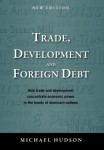[Foreign] Videos
Russia has defaulted on its foreign debt because it offered bondholders payments in rubles, not dollars, credit ratings agency S&P has said. #CNN #News
The book separates from other existing ones on the subject in providing an unparalleled angle penetrating into Washington’s covert and overt maneuvers and designs aiding and abetting a global supportive instrument of a terrorist organization which is motivated to destabilize Sri Lanka. The analyses and interpretations, based on the author’s deep knowledge and insights gained during his tenure at the U.S. Department of State, not found in other works. The link the author discovered between Washington’s settled mindset developed in the 1980s and 1990s on Sri Lanka’s national issues, and post-2009 renaissance of the global supportive instrument of a terrorist group is unique to the readers. The interpretations and analyses of discovered evidence of this cohabitation, and Washington’s adventurism are aptly reflected in the title of the book: Tamil Tigers’ Debt to America: U.S. Foreign Policy Adventurism and Sri Lanka’s Dilemma. This book gives a unique analyses and interpretation of Washington’s foreign policy adventurism using the insights the author gained during his tenure at the U.S. State Department. This insider’s account and alarming analysis have disclosed a development – largely due to Washington machinations – that enabled operative organizations within the Tamil Diaspora to replace the vanquished Tigers and diplomatically continue its secessionist agenda in Sri Lanka. Washington’s disappointment in its failure to salvage Sri Lanka’s Tamil Tiger leadership – which it believed represented the sentiments of the minority Tamils – to use it as a pressure group to influence changes in Sri Lanka was thwarted by the movement’s annihilation in 2009. To avenge the foreign policy setback, Washington created a conducive atmosphere – through its foreign policy advocacy – that facilitated the emergence of a stronger, determined and more coordinated Tamil Diaspora – once effectively functioned to sustain the LTTE – as a global diplomatic movement. One cannot recall in recent memory how a totally annihilated lethal terrorist movement along with its superior military power was resurrected and emerged as a global political movement with a determination to achieve the same objective – a separate state for the minority ethnic Tamils in the north-east region of Sri Lanka. The book’s disclosed link facilitates the readers to understand this scenario.
In Africa’s Odious Debts, Boyce and Ndikumana reveal the shocking fact that, contrary to the popular perception of Africa being a drain on the financial resources of the West, the continent is actually a net creditor to the rest of the world. The extent of capital flight from sub-Saharan Africa is remarkable: more than $700 billion in the past four decades. But Africa’s foreign assets remain private and hidden, while its foreign debts are public, owed by the people of Africa through their governments.
Léonce Ndikumana and James K. Boyce reveal the intimate links between foreign loans and capital flight. More than half of the money borrowed by African governments in recent decades departed in the same year, with a significant portion of it winding up in private accounts at the very banks that provided the loans in the first place. Meanwhile, debt-service payments continue to drain scarce resources from Africa, cutting into funds available for public health and other needs. Controversially, the authors argue that African governments should repudiate these “odious debts” from which their people derived no benefit, and that the international community should assist in this effort.
A vital book for anyone interested in Africa, its future, and its relationship with the West.
Product Features
- Used Book in Good Condition
In this survey of international economic thought, Michael Hudson rewrites the history of trade, development and debt theorizing. He shows that mainstream free-trade surveys are censorial in excluding the protectionist logic that has guided the trade policy of Europe and the United States, especially by leaving out discussion of the transfer problem and payment of international debts. He points out that most economists throughout history have focused as much on war financing as on trade and development. Free-trade ideology and IMF-style financial austerity under today’s rules, rather than benefiting all parties and maximizing welfare, leave “client” nations severely indebted. By excluding dynamics that used to be central to trade theory such as emigration and technology transfer, today’s global production and financial policies tend to concentrate economic and political power in the hands of dominant nations. Prof. Michael Hudson (Economics Department, University of Missouri, Kansas City) is a frequent contributor to The Financial Times, Counterpunch, and Global Research.
Product Features
- ISBN13: 9783980846691
- Condition: New
- Notes: BRAND NEW FROM PUBLISHER! 100% Satisfaction Guarantee. Tracking provided on most orders. Buy with Confidence! Millions of books sold!




